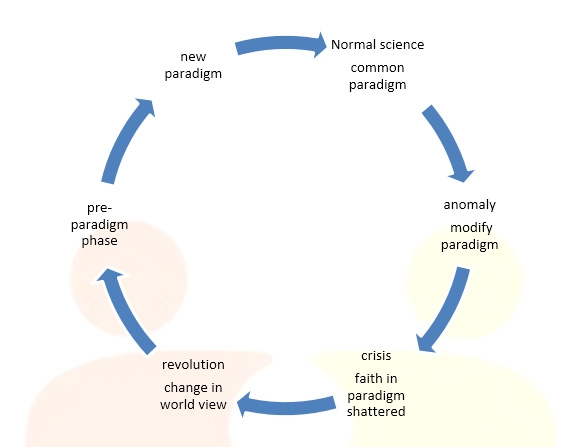Refutability and Anomaly
Thomas Kuhn, an important post-modernist philosopher, criticized the elimination process arguing that in the history of science, refutability did not play a significant role in the transitions between theories. According to Kuhn (1996), comprehending the concept of scientific development as a linear and cumulative process is "getting the wrong image of science". There is a great need to "produce a decisive transformation in the image of science by which we are now possessed" (Kuhn 1996). An alternative representation of the scientific development is drawn from historic examination and focuses on the sociology of scientific community.
The central feature of development is the scientific community that generates research and hence creates knowledge. The community determines which theories will be accepted and which rejected, it enforces (if needed) the acceptance of the current dominant theory (paradigm) and it determines (or at least accepts) when it is time for a paradigm change. "Scientific knowledge, like language, is intrinsically the common property of a group or else nothing at all. To understand it we shall need to know the special characteristics of the groups that create and use it". The dominant theory or paradigm, however, is far more than just a theory or even a group of interrelated theories. It is a total worldview, a way of seeing the world through the constructs provided by the particular branch of science or the particular field concerned. Kuhn (1996) highlighted Newton and Einstein's innovative way of seeing the world. He pointed that chaotic, out-of-order extremity, is the core of inspiration and instigation for bursts of a scientific activity. As a result, this activity initiated a tremendous shift in the theoretical structure of physics and expanded the spectrum of science. Kuhn used the term 'revolution' for describing the characteristics of the transition from one scientific understanding to another.
Kuhn’s thesis about the development of science defines a process which involves phases of normal science (traditional), interrupted by a sequence of extraordinary phases: anomaly -an accumulation of data contradicting the predictions of the paradigm. Crisis - disintegration and destruction of the traditional knowledge structure and establishments. Scientific revolutions - changes in worldview. Pre-science - formulation of a new dominant theory, and finally, when a new dominant theory being developed fully, a new normal science is established. The cycle then continues endlessly.
Kuhn's Scientific Evolution Cycle
Kuhn broadens the statement, indicating that throughout the cyclic process of scientific development, the revolution sets the direction while the normal science does the work. Within normal science the plan is to match theory with nature, but not to actively find criticism or contradictions: "Normal science", means research firmly based upon one or more past scientific achievements. These achievements, adopt for the time being, by some particular scientific communities and serve as foundations for its further practical development" (Kuhn 1996:10). "Normal science" determines what constitutes as scientific activity, and defines what researchable questions and acceptable answers will be possible. Essentially, it provides the boundaries for investigation. Kuhn (1996) characterizes normal scientific research as "strenuous and devoted attempt to force nature into the conceptual boxes supplied by professional education". Loyalty to the dominant paradigm and its normal science is obtained mainly through conversion, coercion and education.
The cycle of repeated revolutions and normalizations of paradigms, is supposed to lead us eventually to the ultimate "theory of everything" (Harris, 1991; Tegmark, 1998; Wallis, 2010). Every time a new paradigm emerges, we hope to believe, we may have finally found the philosopher's stone. The discussion over the new paradigm contains the same enthusiasm characterizing the possibility to discover the answers to all our questions. However, a strong debate exists on whether there is actually such a thing as an ultimate theory of everything. An inevitable anomaly, the next developmental stage, is originated from accumulation of experimental results which contradict the theoretical predictions. One might say that the inevitable anomaly described is evidence to the problematic assumptions concerning the possibility to ever reach to an ultimate theory of everything. As long as the pursuit of an ultimate theory of everything continues, there will always be paradigmatic revolutions (Barrow 1992).
Last updated
